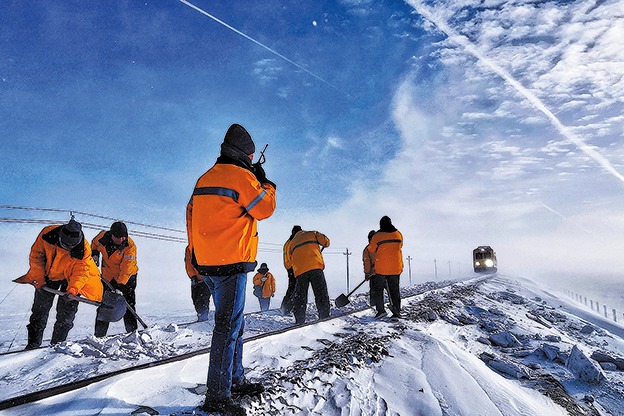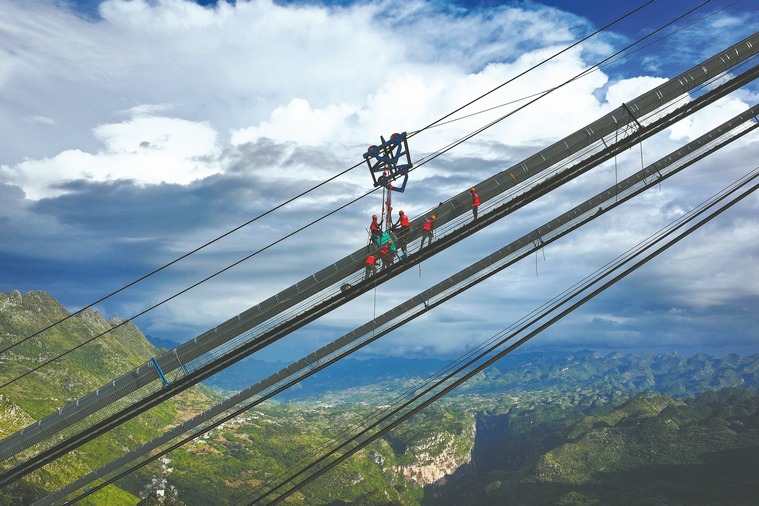On the same plain


There are no hotels out on the plains, so Xin would often call at herdsmen's tents to ask for a meal. The herdsmen always welcomed her and offered her a place to sleep.
In 1998, Xin was recruited by Li Bo, an academician at the Chinese Academy of Sciences, to join his grassland ecology remote sensing team to help build an observation and research station in Hulunbuir.
Xin was keen to start the work, but Li suddenly died six months into the project. After taking three months to overcome her sorrow, Xin decided to finish Li's vision to build the observation and research station at Hulunbuir.
Each year, when the grass began to grow in May, Xin would go to Hulunbuir, and only return when the grass had dried up in November.
She was named executive deputy head of the station in 2005, the first female out of all the executives staffing the 53 wild scientific stations across China.
After years of observation and experiments on the Hulunbuir grasslands, Xin mapped out the key direction for research there, filling in the gaps in analysis into meadow steppe ecosystems through observation and research.
She studied ecosystem modeling for her doctoral degree. By combining all the data her team had collected, Xin realized it could be used to guide herdsmen to better grazing pastures.
Xin developed a software application in 2000 to show herdsmen what kind of plants grow in what area, and she continued collecting data and adding to it. In 2015, Xin and her team published a book summarizing guidelines and methods to cultivate pastures in China.
Two years ago, Xin's team launched an app aimed at helping herdsmen around China to manage their pastures and predict their harvest. Using the remote sensing techniques to observe the ecosystems of the grasslands and combining the data collected by her team of researchers, the app models growth patterns of the grass.
"We used to monitor and manage the situation using remote sensing (aerial scanning). Now with these formulas, we can predict the future and even make future plans based on them, which can raise the income of herdsmen in China," says Xin.
"That's what Li Bo planned 20 years ago, and now I'm fulfilling his vision," Xin says.
Xin is now looking for her successor to take up her work at the station in Hulunbuir, as she thinks it should not rely on her to keep running.
"No matter who is the head of the organization, it should continue to operate efficiently. That's my hope for the station," says Xin.
Xin's team in Beijing now has around 50 researchers, including graduate students, and there are also more than 20 staff members at the Hulunbuir station.
Xu Lijun, 40, joined the station in 2009 and took over its management in February.
"Now I understand how difficult this role is, because besides doing research, I have to take care of the team members, visiting researchers, and also stay in contact with the government," says Xu.
According to him, a four-story building next to their current dorm block is nearing completion.
"There is a list of rankings of all the wild science stations. When I joined in 2009, Hulunbuir station ranked somewhere in the middle, but this year we made it number one."
Xu could tell from Xin's eyes her love for the grasslands when they were first introduced as visiting researchers came to the station to start taking samples.
"She didn't see the introductions as an onerous task, you could tell she enjoys them every time," says Xu.
In Xu's mind, even when Xin is in her office in Beijing, her mind is always thousands of kilometers away in Hulunbuir, and after 20 years spent on the grasslands, the locals have already taken her as one of their own.
Xin has a 12-year-old daughter, who is used to her mother's busy schedule and her working late. From the age of 4, Xin would take her daughter with her to Hulunbuir each summer.
When Xin is working outdoors on the grasslands, she doesn't apply sunscreen, but her daughter covers herself up with clothes and a hat, gloves, sunglasses and a mask.
"My daughter says she will not work on the grasslands when she grows up, as it's too hard, but she's done many samplings together with our quadrat team, and some of the data she has collected are used in some of my student's papers," says Xin.




































